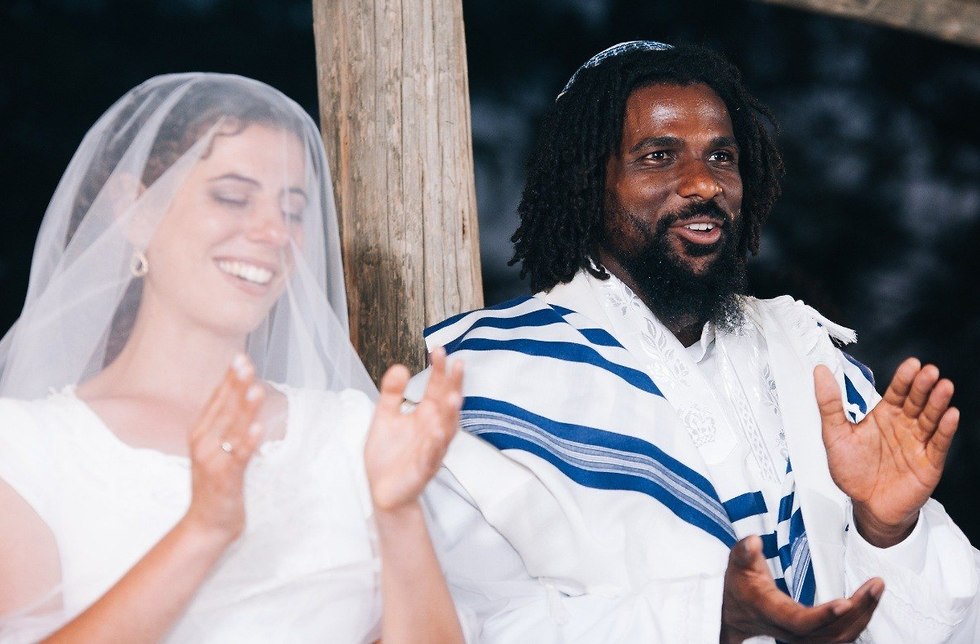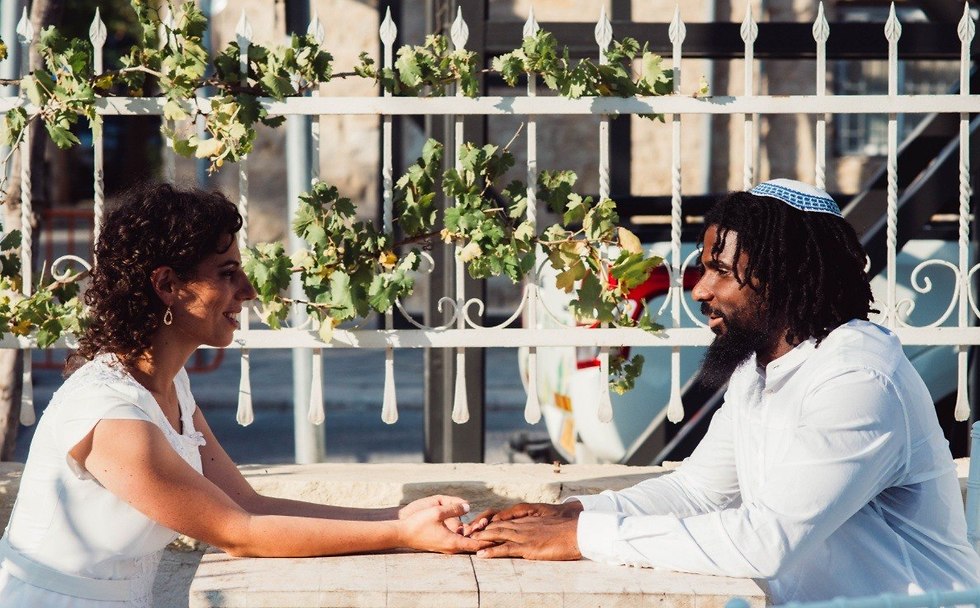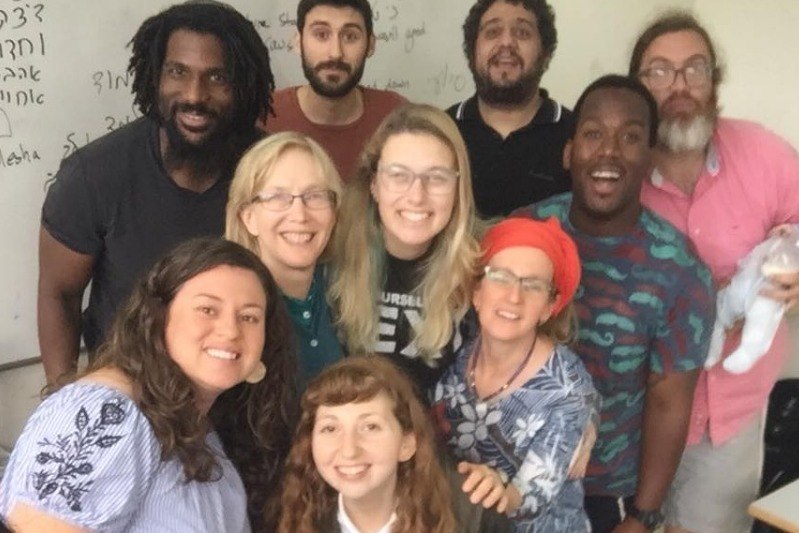For those wishing to reside in Israel, overcoming the long lines and endless delays one faces at the labyrinthine Ministry of Interior may be the most fitting test to prove you have the chutzpah to make it in Israeli society.
During his countless visits to the ministry, David Ben Moshe has gained that requisite Israeli chutzpah. He has not yet gained his citizenship, however, and his ordeal has no end in sight. For over nine months, Ben Moshe has endured some of the worst of Israeli bureaucracy. He’s dealt with suspicion and even accusations regarding his conversion to Judaism, despite his daily visits to the local Orthodox shul. As a black man, he says that he has been singled out by interviewers who have told him he doesn’t look like a convert and there’s no way his Israeli wife’s parents could be happy with him. A former convict who’s changed his life around, Ben Moshe remains stuck in bureaucratic limbo as the question remains: will Israel recognize his teshuvah—his repentance—and with it his claim to citizenship? Or will they even care?Ben Moshe, 31, was born David Bonett to a Christian, African-American family in rural Maryland. After dropping out of college and finding himself short on money, he allowed himself to be lured into Baltimore’s booming drug trade. It caught up with him and in 2010, he was arrested and convicted of one count of unlicensed dealing of firearms and one count of unlicensed distribution of oxycodone, a popular synthetic opioid.
It was while he was serving his 30 month sentence in federal prison that Ben Moshe came across Jewish texts and was taken by the teachings.
“With Christianity, I don’t like the idea of having a universal truth,” he told Tablet. “It seems there are multiple ways to have truth, and you shouldn’t force other people to agree with you. When I found Judaism, I saw it wasn’t like that, and as I read more and more, I realized this made sense for me.”
The Talmud and Tanakh inspired Ben Moshe to turn his life around. He was released early from prison on good behavior, and he immediately began devoting himself to Jewish study, undergoing a years-long process of conversion eventually to embrace Orthodox Judaism. He returned to college, graduated magna cum laude with a degree in exercise science, and became a fitness instructor. He would also volunteer at his local shul and police department. A few years ago, he visited Israel for the first time on a Birthright trip. “It was a monumental experience,” Ben Moshe said. “The second I arrived at Ben-Gurion (Airport), I felt immensely connected with the place. I knew that someday, I’d want to live here.” In 2017, Ben Moshe accepted an offer to enroll in the University of Florida’s doctorate of physical therapy program in exercise physiology. But due to his criminal record, the admissions office chose to make him apply independently to the general university after he had already enrolled. Though already admitted to the program he was subsequently declared ineligible to attend by the director of student conduct at the last minute. But in a way, Ben Moshe saw this as a blessing in disguise. “I thought to myself, ‘If I wanted to live anywhere in the world, where would it be?’” His answer was Israel, and in Spring 2017, he came to the Holy Land. The nine weeks he originally planned to test out life in Israel quickly grew into a year studying at Pardes Institute of Jewish Studies, a nondenominational yeshiva. “What impressed me most was his sincerity and determination to not only live a Jewish life, but also his attachment to the land of Israel,” said Rabbi Meir Schweiger, who has taught at Pardes for over 40 years and has served as Ben Moshe’s spiritual adviser since he arrived in the fall of 2017. “When he spoke to our class, it was inspirational to see someone who through these struggles became so self-aware and made this commitment to practice Judaism.” His intense Jewish studies coupled with his love not only for the land of Israel but an observant Israeli woman named Tamar Gresser. “From the beginning, there was something very natural about (us),” said Gresser. “It felt comfortable and right. My parents had both gone to Pardes, so it felt like a natural connection. Also, my parents both grew up secular and found Judaism in later years. There’s something about the kind of values I was raised in that’s similar to David’s, despite the external differences.” Gresser’s family embraced her husband wholeheartedly. Studying at Pardes and in love, Ben Moshe built a life in Jerusalem, immersing himself within his local communities and volunteering at Etgarim, an NGO that promotes exercise for special needs kids. By February, he knew he wanted to marry Tamar and make aliyah. He found a job as the head personal trainer of Musach Haguf, a physical therapy and fitness center in Jerusalem, which he was slated to begin after his program ended in the spring. After initial difficulties, Ben Moshe’s Orthodox conversion was recognized by the Tzohar Rabbinate, and Rabbi Schweiger officiated his wedding this summer. But applying for citizenship dragged him into a bureaucratic abyss from which, months later, he is yet to emerge. The Law of Return invites all Jews of the world, and their spouses, to become citizens of Israel, but it has its limits. A 1954 amendment gave the minister of interior the right to deny citizenship to a Jew if they are “a person with a criminal past likely to endanger public welfare.” This amendment has been used to prevent Israel from becoming a haven for Jewish criminals. The most famous example is Jewish-American mobster Meyer Lansky, who was denied citizenship in 1972 and subsequently deported back to the US despite having no previous convictions. The Supreme Court has since ruled that Israel must take into consideration the severity and frequency of the applicant’s criminal past, as well as how much time has elapsed since their conviction and their subsequent behavior, to decide whether they would endanger the public welfare. Ben Moshe’s criminal record meant that he had to deal directly with the Ministry of Interior. Before they accepted his application, Ben Moshe said the ministry forced him to make eight trips there and spend nearly $1,000 in related expenses, demanding more documents each time. Among the references he submitted affirming his rehabilitation and character were his former probation officer, American and Israeli rabbis, and family friends. They finally accepted his application at the beginning of May. Three weeks later, Ben Moshe received a document stating his aliyah application was pending, which was supposed to render a visa unnecessary. The ministry told him he should expect a decision “any day.” In June, he attended a workshop for personal trainers and physical therapists in Hungary. But when he returned, he was detained at Ben-Gurion Airport and subjected to five hours of interrogations. Recounting the incident, Ben Moshe said the interrogating official accused him of having been in Israel illegally and, further, claimed that it is illegal to try to make aliyah from within the country. Neither of those claims was true—Ben Moshe had the proper documentation for his pending application which permitted him inside the country, and the Jewish Agency prominently advertises its Change the Status program to make aliyah from within the country. The border patrol officials only relented, Ben Moshe recalls, when he mentioned his impending wedding and suggested his lawyer get involved. They gave him a three-month tourist visa while threatening deportation after that was up. Thus began Ben Moshe’s weekly visits to the Ministry of Interior to inquire about his status, which resulted eventually in an offer to interview him following the High Holy Days—at which point his visa would have already expired and he’d be subject to deportation. The African-American Jew did what any Israeli would: He refused to leave his seat until the ministry gave him another tourist visa. The interview finally came at the beginning of October. It was not what he had hoped for. According to Ben Moshe, a ministry official accused him of converting to Judaism just to make aliyah. She told him that “you don’t look like a convert.” Ben Moshe, a tall, fit black man with dreadlocks, wears a kippah and tzitzit. Ben Moshe recounted to Tablet how he was berated by ministry officials who told him he should go back to America and try to make aliyah from there. When he told the official of the life he was building in Israel with his wife and her family, the response was: “How could your wife’s parents be happy with you?” The interview concluded with the ministry officials informing him that he was to now wait for Minister of Interior Aryeh Deri’s personal decision on his application. They also told him that when his tourist visa ends in December, he can pay for a new tourist visa—implying that they had no plans to come with a decision before then. Sharon Gilad, a political science professor at Hebrew University who researches governmental bureaucracies, said that general research shows bureaucrats “tend to interpret the exact same information more harshly” when it pertains to members of minority groups. Gilad believed it was “entirely plausible that if David Ben Moshe was a Jewish-born Caucasian-American, the Ministry of Interior would have assessed the ‘danger posed to public security’ as much lower.” After repeated requests for comment on Ben Moshe’s case and an explanation of their internal process on such matters, a spokesperson for the Immigration and Population Authority said, “We hope to make a decision as soon as possible. And we can’t add more than that.” Still unable to begin his work in Israel, Ben Moshe exercises and reads to pass the time, attending shul every morning at 6am. But while he maintains a laid-back demeanor and easy laugh, his friends and family are increasingly frustrated with the treatment he’s received. “I have rarely met someone like him who I have felt is so sincere in his Judaism,” said Rabbi Schweiger. “To his core, he is such a good person. That’s why I have found this whole situation to be extremely disturbing. He would be the last person this should happen to.” Ben Moshe’s lawyer, Assaf Benmelech, is frustrated as well. “If you reject his application, you reject the belief that one can change,” said Benmelech, who is representing Ben Moshe pro bono. “The Jewish belief of teshuvah says that anyone can repent, can grow and become a new person. And David is clearly a new person.” Benmelech added, “It is not only a moral issue–from a legal perspective, David has a right to make aliyah.” Ben Moshe’s future employer, Dara Saker, has now been waiting over five months for her prospective employee to become eligible to work for her. He has several certifications in personal training not commonly found in Israel that she needs to grow her business. “He is a wonderful person,” Saker said. “He’s a married man. It’s so silly. It’s ridiculous. Are they trying to wait until he gets so angry and fed up with this country he just leaves this place?” All Ben Moshe can do now is wait for a decision to come from Interior Minister Aryeh Deri personally. Deri had first served as interior minister before he was convicted in 1999 of bribery, fraud and breach of trust in that position. “He got his life back—will he have compassion with me?” Ben Moshe wondered.This story originally appeared in Tablet Magazine, at tabletmag.com , and is reprinted with permission.
If you wish to help Ben Moshe take his case to court, you can donate to his GoFundMe campaign .
The trials of David Ben Moshe : https://ift.tt/2zFMf25


No comments:
Post a Comment